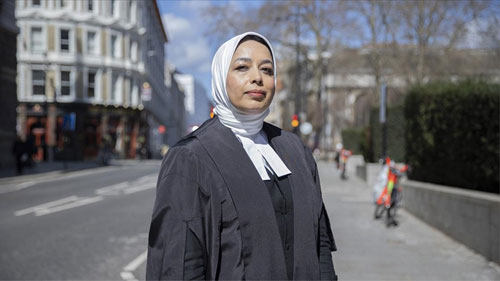Sultana Tafadar, the UK’s first hijab-wearing criminal barrister, who also became the first hijab-wearer from the Criminal Bar to be appointed Queen’s Counsel, aims to set an example for women on pursuing their dreams and reaching goals.
Tafadar, who reached the highest mark of excellence a lawyer can hold in the UK, shared her success story with Anadolu Agency.
As a human rights, international law and criminal justice barrister specializing in counterterrorism and national security cases, Tafadar is the middle daughter of immigrants who moved to the UK from Bangladesh.
There are currently just two hijab-wearing Queen’s Counsels in Britain: Shaheed Fatima, a public law barrister, who was appointed in 2016, and criminal barrister Tafadar, who was appointed on March 21 this year.
“Undoubtedly, most of us face challenges at work. Women tend to face certain challenges, women from minority backgrounds face challenges, and women who are visibly Muslim or wearing a hijab tend to face certain challenges,” Tafadar said.
Tafadar, who was called to the Criminal Bar in 2005, was born and raised in Bedfordshire, where she attended a local state school.
Less than 2% of lawyers in Britain become Queen’s Counsel, most practicing as barristers or advocates in Scotland.
Meanwhile, becoming a Queen’s Counsel is a tough process in the UK since the lawyers usually need to have at least 15 years of experience for the application. They make an application to be considered, supplying 12 key cases in the last three years, with 12 judges, 12 barristers and 12 solicitors as referees.
There are 1,928 Queen’s Counsels in Britain – less than 2% of the entire legal profession. “It wasn’t an easy journey. And that’s why I’m absolutely delighted to be in this position. It’s a very long process. It’s a difficult journey,” said Tafadar, referring to her success path.
She underlined that if looking at the number of women who have ever been appointed Queen’s Counsel, the numbers “aren’t that large.”
“So only about 575 women have ever been appointed Queen’s Counsel. If you look at people from minority Black or ethnic minority backgrounds, at the moment, there’s about 34 women that have been appointed. And in terms of women that wear the hijab, there’s just two of us. And I’m the first one at the criminal bar,” she said.
Noting that achieving the high mark of excellence was quite a “long and difficult process,” she stressed that “the odds aren’t always in our favor.”
“And it’s every lawyer’s dream to become Queen’s Counsel,” she added. Tafadar said when she just started off, she was the only person at the criminal bar wearing the hijab.
“I used to go to court. And a lot of the time, the courts would go very silent, and they weren’t quite sure who I was and what I was doing there. They’d ask if I was the defendant. Most of the time, they’d ask if I was the interpreter,” she said.
“And so you have those hurdles to overcome, where people make assumptions about who you are. They make assumptions about your ability, and so it does take time to break those assumptions down. So those are the types of challenges I’ve faced throughout my career, Tafadar added.
Speaking on France’s ban last month on advocates wearing the hijab, Tafadar said “the irony is just quite sad.”
Tafadar recalled that by being appointed Queen’s Counsel, “which is effectively saying I’m in the top 2% of the legal profession,” she has done a “very good job” throughout her career.
“I wore my hijab at my appointment to this position. Other lawyers wear wigs, but I am exempt from wearing them. And it’s sad because just across the (English) Channel, you have a whole different scenario where lawyers aren’t allowed to go to court wearing the hijab, women aren’t allowed to realize their capacity and their full potential,” she said.
“They aren’t allowed to. And it’s not just in court, but in all spheres of life. They’re not allowed to engage in sports, they’re not allowed to engage in public.—Anadolu Agencies










